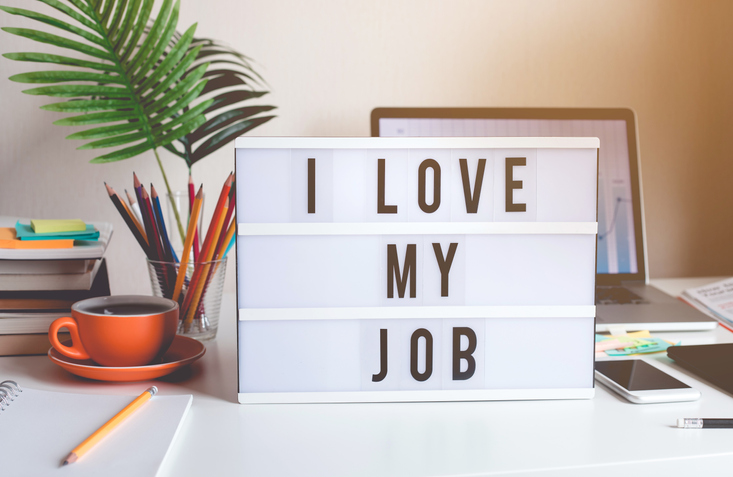Sarah Jaffe’s recent book, Work Won’t Love You Back: How Devotion to Our Jobs Keeps Us Exploited, Exhausted and Alone, examines how and why our jobs expect more of us than ever before, and how workers in a variety of industries have begun organizing their workplaces and coworkers. Lena Eckert-Erdheim sat down with Jaffe to talk about what inspired her new book, the work of organizing, and the urgency of transforming the way that we think and feel about work.
What inspired you to write the book?
The world of work changed a lot over my lifetime. I’m forty. [Work] had changed in ways that made it more necessary to show up with more emotion, more of your personality, more of your mental capacity. Work was asking more of us than ever before, and we were also just that much more likely to be expected to like it. And that all starts to really feel like bullshit after a while. I think it started to feel like bullshit when I was working in a restaurant and making $2.13 an hour, which is still the tipped minimum wage, and my boss would be like “Why aren’t you smiling?” Also, “Go scrape gum off the undersides of the table because we don’t have any customers.” I was like, if we don’t have any customers, it means I’m not making any money. And so the combination of coercion and also emotional blackmail very much shaped my outlook on the world.
In a lot of ways, your book is about the post-1970s economic formations and transformations that produced our contemporary work lives — the shift towards the unpaid internship, the rise of the service and caring economies, emotional labor, the increase in precarity of formerly, solidly professional, supposedly stable sectors. And in some ways, the book is about the unintended consequences of the social movements of the 1960s and 1970s and the ways that people wanted to transform work and the economy.
I would say not so much unintended consequences and more the ways that capitalism is very good at absorbing things. They didn’t get what they wanted, right? It was not like they won and there was a little side effect. It was like, they were crushed and handed some crumbs, and the fact that what came out of the massive revolutionary feminist movement is most women are in the paid work force doing shit work for no money. That’s not a win by any stretch of the imagination. Even if you’re literally just looking at the Betty Friedan level, we still haven’t friggin’ won.
Capitalism is going to try to co-opt everything because that’s what it does, and it’s exceedingly good at it. I guess the real nasty, miserable, unfortunate lesson at the end of that is [capitalism] won’t stop doing that until we destroy it. And what we have to do to destroy it is change the way we work and produce and overhaul our relationship to our labor. [Our labor] is still the thing at the heart of the capitalist mode of production. So here we are. Everything else is still going to be a short-term solution. That doesn’t mean we shouldn’t fight for short-term solutions because people are dying, and we need to make it better for a lot of people, real fast.
Have you ever organized your workplace?
I have. I didn’t really figure it out when I was working in the service industry. I was in the grad student’s union when I was a grad student, and I organized a couple of workplaces that I worked at in progressive media. I wrote a chapter about non-profits in this book and a lot of those stories are very familiar to me because it’s a similar situation [to working in progressive media] where you are somebody who believes in the work that you’re doing and you feel like you have to do it because you owe it to the people that you are reporting on. And therefore, you eat a lot of shit. I constantly have to remind myself not to do more work than I’m getting paid for a lot of these articles because I don’t get paid enough by the vast majority of places that I write for. And a lot of them are very aware that that’s true. Most of them would say, certainly most of the editors that I work for these days, would say that they wish they could pay me more. But I still have to eat.
As I was reading your book, I was thinking about the unpaid work of organizing too.
Organizers are workers too and deserve to have a union and decent working conditions, and also it doesn’t benefit a movement to rely solely on exhaustion and burned-out people. People will drop out and start skipping meetings and not be able to commit to it because its culture is not forgiving. I was talking to Ellen Bravo about 9to5. She was saying, “I really hate the narrative of the tireless organizer because we do get tired. We’re humans. We were parents. We were people. And we did get tired. And this idea that we should be tireless is ridiculous. And we needed to set the example of what we wanted in the workplaces we were organizing.” That meant staff at 9to5 got paid family [leave], back when that was even rarer a thing in this country. They thought, if we are trying to win these conditions in the workplaces that we are trying to organize, we need to have them ourselves. We need to have an understanding that this is for the long haul and that means we have to have sustainable lives and we can’t just burn ourselves out. There are moments like [that in] the last few weeks of a union drive: everybody works a lot and is exhausted and then hopefully it stops and you get a break. [To win, we] need a labor movement that respects that people are people.
In movement work, people talk about love all the time.
Yeah, I mean, it’s exhausting, right? But it is so funny too because my entire social life is just people that I know from political work and whatever. And then it’s just like oh, what do we talk about in our down time? We talk about the movement. We talk about the struggle. And at the same time, I need people in my life who understand that because I can’t, on some level, relate to people who don’t look at how broken everything is and go aah, especially now in 2021, all of the multitude of crises we’re dealing with. People who are just sort of going through their lives who aren’t political people all day long, what level of denial are you on, my man? Or do you just think it’s good? It feels impossible to relate to people who don’t [engage politically], but that is also a recipe for exhausting ourselves.
It’s equally important not to romanticize the actual work of movement building or organizing.
Yeah. When I was working on my first book, I went to Ferguson to talk to folks from that movement there, and they were talking about, we have community care nights because it’s not enough to just tell people to do self-care, do self-care, do self-care. We actually have to build into our movement that we take care of each other, that we pool our money and bring a massage therapist around, or we have circles where we meet and talk about the trauma that we have undergone by being tear gassed for months straight. That actually has to be part of it too. How do we make this a thing where we also have reciprocal relationships of care and not just exhaustion and not just more work.
Katherine Wilson, an adjunct professor that you interviewed, remarked that the only time she felt dignified working at the university was the work that she did in the union. I was thinking about the dignity of work, the dignity of the workplace as a rallying cry of the labor movement and how dignity is very distinct from love. [Dignity] doesn’t necessarily require that we find work pleasurable or fulfilling.
I don’t love that one either because a lot of the time, work isn’t dignified. This is what Kate is saying. Most of her work doesn’t feel dignified at all, and she actually has to fight for it. That’s what the labor movement has done. It’s trying to bring some dignity into people’s lives in working conditions where they often don’t [have it]. Amazon workers are talking about being timed how long it takes to pee. There is no dignity in that.
There’s a difference between the dignity of work and the dignity of workers.
Right. Exactly. And also, there are a lot of people who can’t work. There are a lot of people who are unemployed right now because half of capitalism is shut down. There are a lot of people who have disabilities, who are ill, who are old, who are retired, who are children, who cannot, should not, do not need to work and are also still dignified human beings. This idea that you’re only worth something if you work, we’ve seen where that gets us. It gets us the lieutenant governor of Texas saying grandma would be happy to die to keep capitalism going. It gets us denying prisoners COVID vaccines because they’re not productive citizens. It leads to people justifying people dying of COVID because they already had a disability or an illness. I don’t think fetishizing work gets us anywhere good, and that’s stuff that I’ve learned from disability rights movements, elder’s rights movements, and prison abolitionists.
Are there other kinds of demands that you think should be more common?
I think it’s past time for the American labor movement to get back on board with shorter hours. That was a major unifying demand of organized labor around the world for so long, and we’ve dropped it. In Europe, it’s a little bit easier to talk about. Their organized four-day week campaigns are actually getting somewhere. Spain is trialing four-day week. The French are constantly having massive general strikes and lighting things on fire [to] keep the 35-hour week. And in the U.S., we kind of just dropped it. I remember when [the] Our Wal-Mart [campaign] was getting started, they at first demanded $25,000 a year, regardless of hours. I actually thought that that was a more radical demand than $15 an hour because that was like, all right, you don’t want us to work it, we won’t work it. But you’ve got to pay us anyway.
And UNITE HERE’s “One Job Should Be Enough” campaign, that’s another good example. But there still [aren’t] really shorter hours campaigns. What would it actually look like if you thought about, what is the work that needs to be done? How do we distribute that [so that] everybody has to do some of it, but we don’t have some people who are working eighty-to-ninety hour weeks and others who are unemployed and others who are Jeff Bezos. That’s the thing that I keep going back to with COVID: we’ve learned that you can actually stop most of capitalism. Also: the government can just give us money.
How are you thinking about the impact of the pandemic on our experiences of work, on our narratives of work, on what it means to organize?
COVID just proved again that work sucks and that certain kinds of work are devalued and not appreciated. And that only got worse. We only got worse to teachers. We only got worse to mothers. We only got worse to adjunct professors. Everybody’s conditions got worse.
COVID has just made everything that much more obvious. The brutality of work, which was always there, is just that much more visible and the fact that work is this death-making institution. It’s that much more clear when we’re looking at the numbers of how many people work in meat-packing plants who died or worked in the Amazon facilities that died or worked in the Hunts Point Terminal Market. The necessity of organizing is that much more obvious even as, in some ways, it’s become harder. People are realizing that our conditions are collective.
I wanted to thank you for writing a book about organizing that was not Pollyanna-ish.
I mean, we’re not just going to tweet or hashtag general strike and materialize a general strike, but people are definitely organizing and they’re pissed off about work. And that’s not getting less true.


